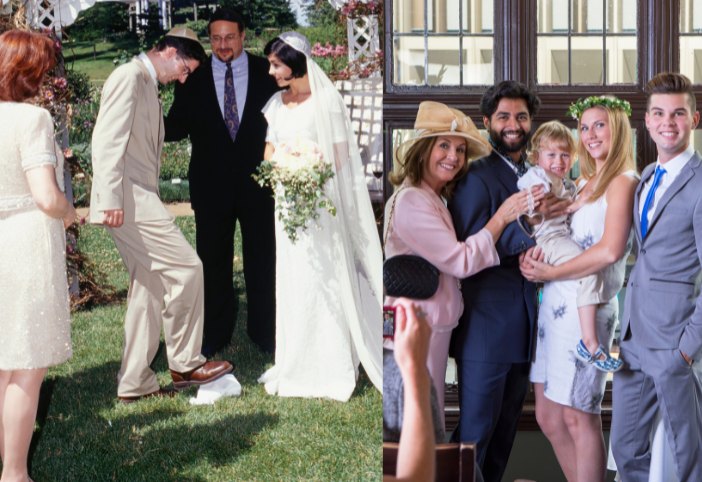Shattered Glass and Shared Dreams: The Newlyweds’ Path from Wedding Rituals to Real Estate Decisions
The vibrant echo of shattered glass at a Jewish wedding is like the striking of a grand, invisible gong, ringing in a new chapter of life. This age-old tradition is more than just a charming ceremony characteristic; it’s a defining moment, a stitch in the fabric of time that weaves together joy and sorrow in a single, resonant note. Amidst the infectious exuberance, a serious undercurrent imbues this moment profoundly.

Imagine the echo of the glass’s shattering, bouncing off the wedding hall’s high ceiling. This sound is a ghost of Jerusalem’s past, a spectral reminder of a city once reduced to rubble and ashes centuries ago. Standing on the precipice of wedded bliss, the groom crushes a glass underfoot to remember this sorrow that echoes through Jewish history and how stained glass first started. It’s as if he is treading on a mirror, each shard reflecting a fragment of his people’s hardships.
However, this ritual isn’t just a solemn nod to communal grief; it’s a universal acknowledgment of individual suffering, reflecting our shared human experience. Everyone has faced a moment when they felt as fragmented as the shards of shattered glass, and their spirit seems to break under the weight of loss or heartache. Yet, hope often emerges from these broken pieces like a phoenix rising from the ashes.
More than a Jewish Tradition
Glass smashing is an age-old and time-honored tradition (believed to have started around the 4th century CE) that forms a delightful characteristic of Jewish weddings. It marks one of the most pivotal moments in the ceremony, simultaneously symbolizing joy and sorrow. While guests congratulate the newlyweds with fervent zeal, this exuberance belies this ancient ritual’s somber meaning.
For Jews worldwide, breaking a glass at weddings remains a poignant reminder of Jerusalem’s destruction centuries ago when it fell to invaders who looted its treasures and razed its holy temple to ashes. Thus, the groom remembers his faith’s past sorrows by crushing something precious underfoot— fine crystal or humble pottery— even amidst rejoicing in his blissful union.
This act speaks not only to communal grief but also individual suffering—for every person has suffered loss somewhere along life’s journey—leaving them feeling shattered inside like fragments left after smashed glassware. But from such brokenness comes hope— something beautiful can emerge from darkness and pain. The Jewish wedding glass-breaking tradition is a powerful symbol of joy and sorrow, representing the destruction of Jerusalem’s temple while celebrating the union of two individuals and the creation of a new family.
The shattering of glass at Jewish weddings is a poignant moment of reflection amidst the joy and celebration, serving as a reminder of the delicate balance between happiness and sorrow in life. This symbolic act, imbued with deep historical significance, marks the culmination of the marriage ceremony and the start of a new chapter for the couple. As the echo of the breaking glass fades, the guests erupt into jubilant applause, their cheers punctuating the air with heartfelt wishes for a future filled with prosperity, health, and shared moments of joy for the newlyweds.
Similarly, purchasing a new home serves as a symbolic threshold, a concrete manifestation of the newlyweds’ commitment to each other. This isn’t just a financial investment but an emotional one, symbolizing their readiness to embark on a shared journey of creating a life together.
Like the broken glass, the house is a testament to the reality of life’s highs and lows. There will be laughter echoing through the halls, shared meals in the dining room, and perhaps the patter of tiny feet on the hardwood floors. But there will also be disagreements, trials, and tribulations. Yet, just as they did at their wedding, the couple will navigate these challenges together, strengthening their bond and deepening their understanding of one another. While vastly different in nature, the broken glass and the new house are bookends to the same beautiful story — the start of a shared life journey.
Wedding Aftermath: Whether to Buy a House or Rent?
Newlyweds would start their shared life journey by facing joys and sorrow when deciding whether to buy a new home or rent a temporary space. Before making this decision, it is necessary to consider factors such as the route the driver will be taking and their preferred riding style when purchasing a vehicle or the investment potential and expected rate of return when buying a house.
Entering the marriage maze, the next challenge often arises—should the newlyweds buy or rent a house? Picture this decision as standing at crossroads. One path leads to a charming home with a white picket fence, symbolizing stability and permanence. The other path leads to a stylish apartment, offering flexibility and less maintenance.
Buying a house is like nurturing a sapling, watching it grow into a sturdy tree over time. It allows you to build equity, offers stability, and often appreciates value. Yet, it also requires a significant financial commitment and ties you to a specific location. On the other hand, renting is like swinging from vine to vine, allowing you to move freely if your job location changes or you wish to explore new horizons. While it offers flexibility, it doesn’t allow you to build equity, and you have limited control over your living space.
The decision for newlyweds to buy or rent a house largely depends on their circumstances, financial situation, and long-term goals. Both options have their pros and cons:
Buying a House
Pros:
- Equity: Homeownership allows you to build equity over time as you pay off your mortgage, and this equity can then be used for other investments or financial needs. For example, home prices in Los Angeles (average price in 2023: $901,291) have been on an upward trend, allowing homeowners to sell their homes for a profit.
- Stability: Owning a home offers a sense of peace and permanence. It allows full control over your living space, including modifying and improving.
- Potential Appreciation: Real estate often appreciates over time, which can increase your wealth.
Cons:
- Financial Commitment: Buying a home requires a significant financial commitment, including a down payment, closing costs, and ongoing expenses like property taxes, homeowner’s insurance, and maintenance.
- Less Flexibility: Homeownership might tie you down to a specific location. If job opportunities arise in other places or you simply want to move, selling a house can be complex and time-consuming.
- Risk of Depreciation: While homes often appreciate, they can also lose value due to market fluctuations or other factors.
Renting a House
Pros:
- Flexibility: Renting provides more flexibility. It’s easier to move if your job location changes or you decide to live in a different area or another type of home.
- Fewer Responsibilities: Renters generally don’t have to worry about maintenance, repairs, or other responsibilities with homeownership.
- Less Initial Cost: Renting often requires a smaller initial investment than buying (typically a security deposit and first month’s rent).
Cons:
- No Equity: When you rent, you’re not building equity. Your monthly payments go to the landlord, not toward your own asset.
- Rent Increases: Rent can increase over time, and you have no control over these increases.
- Limited Control: You cannot customize your living space as a renter. Suppose your loved ones who will visit depend on special modifications or accessibility features like handicap ramps. In that case, you may only be able to find a rental property that meets your needs with significant modification costs.
Ultimately, buying and renting depends on the couple’s financial readiness, long-term plans, lifestyle preferences, and housing market conditions. Speaking with a financial advisor or real estate professional before making this significant decision is always a good idea.
The Joys and Sorrows of Life After the Wedding
The Jewish wedding glass-breaking tradition and purchasing a new home symbolize the delicate balance between happiness and sorrow. As couples begin their lives together, they must navigate the joys and sorrows of making significant decisions such as buying or renting a house.

These traditions remind us that life is not simply about the good times but a beautiful tapestry woven with joy and pain. They encourage us to cherish moments of happiness while remaining mindful of life’s fragility.
Both traditions also represent new beginnings and the start of a new journey, whether in marriage or homeownership. They mark significant milestones in life that involve commitment, responsibility, and the inevitability of change. Considering homeownership, weighing the advantages and disadvantages of buying versus renting is important.
However, as customs and traditions continue to evolve, we see a shift towards non-traditional weddings that reflect the values of self-expression and opposition to the religious authority monopoly. This is reflected in the rise of non-religious and interfaith marriages and the increasing popularity of personalized wedding ceremonies that incorporate the couple’s unique backgrounds, interests, and beliefs.
Despite these changes, the significance of wedding traditions and starting a new life together remain constant. The traditions and rituals surrounding weddings, such as the Jewish wedding glass-breaking tradition, provide a tangible representation of the profound emotional commitment between two individuals. Furthermore, purchasing a new home together physically manifests their passionate commitment and journey.
Whether it’s the shattering of glass at a wedding or the purchase of a new home, these symbolic acts remind us that life is fragile yet resilient and that moments of joy can emerge from even the greatest sadness. Therefore, we need to recognize and cherish these moments, holding them tightly during difficult times as a source of hope and inspiration.

